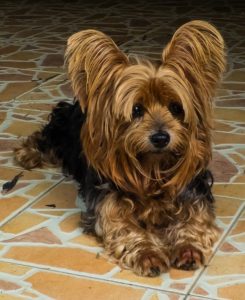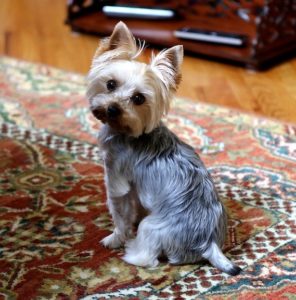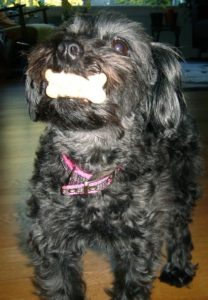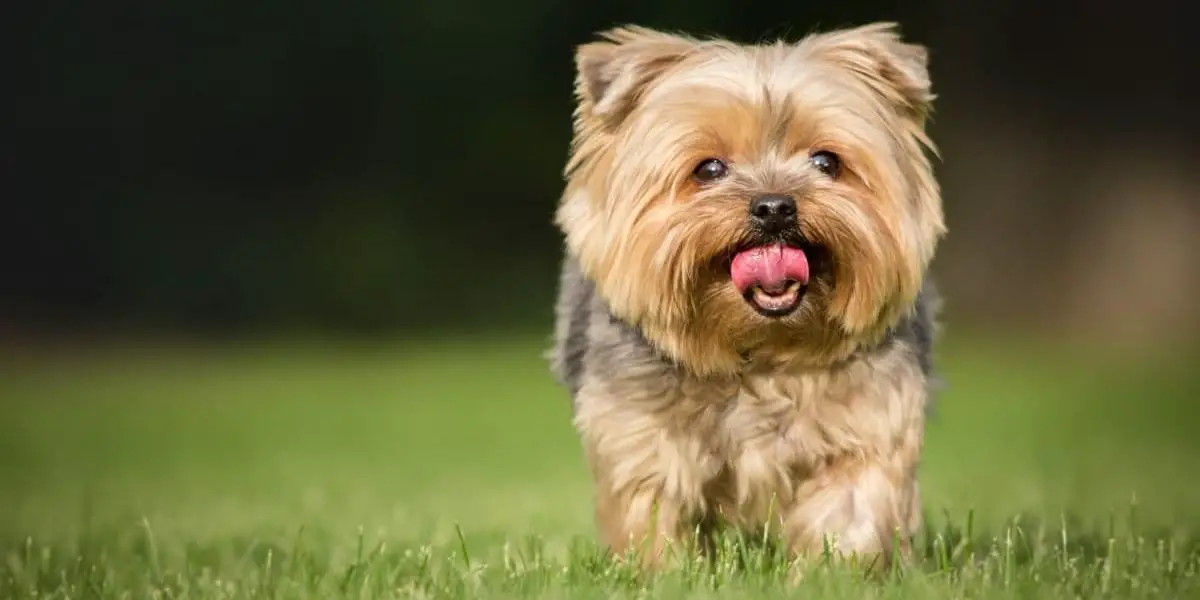One of the most popular dog breeds in the world is the Yorkshire Terrier or Yorkie for short. These beautiful animals have been recognized as a dog breed since the mid-19th century. They originated in the English county of Yorkshire. Today, we are going to take a deeper look at this dog breed and learn what separates them from the pack.
Qualities of a Yorkie
 Temperament
Temperament
When it comes to the Yorkie most of the dogs from this breed are very protective. They are not submissive and normally don’t make a good lap dog. Their protective behavior makes them unsuitable for families with small children. However, they make the perfect pet for families that are older.
Most breeders will recommend that children be at least 10 years old before bringing a Yorkie into the home. This will not only help protect the child, but also the dog will be more comfortable around older children. Older children will know how to handle a Yorkie. These dogs, being small, can easily become injured if played with roughly.
Easy to Train
Yorkies are very smart and can be easy to train. They are easily motivated by praise or food which makes them ideal for training. While they are not pushovers, they learn very quickly and love to please their owner.
Adaptable
 In addition to being easy to train, these dogs travel well. They can adapt to just about any surroundings and feel at home when their owners are nearby. Yorkies are often shy around other dogs, and they like to stick close to the people they consider family. If you already have other dogs in the home, you may want to reconsider owning a Yorkie. They are very people oriented and can become very jealous of other dogs.
In addition to being easy to train, these dogs travel well. They can adapt to just about any surroundings and feel at home when their owners are nearby. Yorkies are often shy around other dogs, and they like to stick close to the people they consider family. If you already have other dogs in the home, you may want to reconsider owning a Yorkie. They are very people oriented and can become very jealous of other dogs.
This breed was once used as a working dog, so they need lots of exercise. Yorkies that are not given proper exercise may become problematic. While they don’t need as much exercise as other larger dogs, they do require to be walked at least a few times a day. This will help them tame their energy levels and keep them happy. If you don’t have time to walk your pet, make sure that someone does it for you.
Size
 Yorkies are small dogs and some are very tiny. The sex of the dog does not determine the weight as both males and females often weigh the same. According to the breed standards, a Yorkie should weigh between 4 to 7 pounds. Anything under 4 pounds is not desirable, and anything over 7 pounds is not within the breed standards. Height is also not determined by sex and most Yorkies are expected to be between 6 to 9 inches tall. This has been the breed standard for many years and it is not expected to change.
Yorkies are small dogs and some are very tiny. The sex of the dog does not determine the weight as both males and females often weigh the same. According to the breed standards, a Yorkie should weigh between 4 to 7 pounds. Anything under 4 pounds is not desirable, and anything over 7 pounds is not within the breed standards. Height is also not determined by sex and most Yorkies are expected to be between 6 to 9 inches tall. This has been the breed standard for many years and it is not expected to change.
However, some Yorkies have a larger bone structure that makes them taller and weigh up to 10 pounds. While this is not standard of the breed, these larger dogs make great pets. So, if you are not concerned with breed standards, you may, in fact, wish to own a larger Yorkie. These larger dogs are sturdier and they often get hurt less due to their size.
Health and Lifespan
The average lifespan of a Yorkie is 13 to 16 years. These dogs live much longer than larger breeds, which means that you will have to be dedicated to them for a longer time. Some Yorkies do live longer than 16 years if given proper care and the correct food. Yorkie lifespan should always be taken into account when purchasing a new puppy.
 When it comes to health, the Yorkshire Terrier is generally a healthy breed. They do have some health issues as all dog breeds do. Some of the things that you should keep an eye out for is cataracts. Older Yorkies are especially susceptible to this condition.
When it comes to health, the Yorkshire Terrier is generally a healthy breed. They do have some health issues as all dog breeds do. Some of the things that you should keep an eye out for is cataracts. Older Yorkies are especially susceptible to this condition.
Also, these dogs have a very delicate digestive system. Changing their diet suddenly can have a negative impact on their health. In addition to these health concerns, Yorkies have a tendency to contract bronchitis and other breathing problems which is due to their small size. You should always take your Yorkie to the vet for annual checkups and regular vaccines. Seeing your vet regularly can help prevent many of the health concerns related to this breed. As your dog ages, you should always keep an eye out for behavior changes that could indicate an underlying problem.
Feeding
Yorkies love to eat and they can often become overweight if you do not monitor their food intake. The diet of a Yorkie will depend on the age of the dog. Below you will find information that can be helpful when determining how much to feed your new pet.
Know What They Weigh
 Before deciding how much to feed your puppy or adult dog, you will need to know their weight. Don’t guess when it comes to weight. Instead, purchase a cooking scale and weigh your dog. This will help you determine how much food you should give them. After you know your dog’s proper weight you can use the recommended guidelines on the dog food bag. This will take the guesswork out of feeding your new pet.
Before deciding how much to feed your puppy or adult dog, you will need to know their weight. Don’t guess when it comes to weight. Instead, purchase a cooking scale and weigh your dog. This will help you determine how much food you should give them. After you know your dog’s proper weight you can use the recommended guidelines on the dog food bag. This will take the guesswork out of feeding your new pet.
Puppies
When it comes to young Yorkie puppies, you should be feeding them freely. As these young dogs grow they will need to have access to food 24 hours a day, for at least the first 3 months of their lives. This will help them to gain weight and it will condition them to become healthy adults. Puppy formula should be the food of choice at this age.
3 Months
 Once your Yorkie has reached the age of 3 months to 1 year of age, you should be feeding them 3 to 4 times a day. Free feeding at this age may make housebreaking much harder. Also, they may become overweight if allowed access to food all day. Puppy formula should still be given at this age.
Once your Yorkie has reached the age of 3 months to 1 year of age, you should be feeding them 3 to 4 times a day. Free feeding at this age may make housebreaking much harder. Also, they may become overweight if allowed access to food all day. Puppy formula should still be given at this age.
1 Year and Older
When a Yorkie has reached the age of 1 year, the feeding schedule will not change. However, this is the time when you should slowly start to switch from puppy food to an adult formula. This will provide your pet with the proper nutrition they need, without them becoming overweight. Always keep in mind that changing the diet of a Yorkie should be done over time. Taking away their puppy formula and giving them adult food should be slowly introduced. This will help prevent digestive issues that can become problematic with this breed.
Yorkie Variations
There are several Yorkie variations that exist but the Teacup Yorkie and the Yorkie Poo are two of the most popular variations that you will find. These dogs are both cute and make wonderful pets for the right person. Below, we will learn a little more about these popular dogs. Each of these dogs is very similar, but they do have some differences that should be noted. Let’s take a look at these cute and cuddly Yorkie variations.
The Teacup Yorkie
 When it comes to cuteness, the Teacup Yorkie is overloaded with adorableness! These tiny versions of the Yorkshire Terrier weigh around 4 pounds and can even fit in the palm of your hand when young. However, some things are very different between the Teacup variation and the standard breed.
When it comes to cuteness, the Teacup Yorkie is overloaded with adorableness! These tiny versions of the Yorkshire Terrier weigh around 4 pounds and can even fit in the palm of your hand when young. However, some things are very different between the Teacup variation and the standard breed.
These smaller dogs have a lot of health issues that normally would not affect larger Yorkies. These issues can cause them to become ill more frequently. Unfortunately, a Teacup Yorkie’s lifespan is much shorter. If you are planning on owning one of these dogs, you will need to keep this in mind. Also, you should consider that you may have large vet bills due to the sickly nature of these dogs.
The Yorkie Poo
 Another variation of the Yorkshire Terrier is the Yorkie Poo. These dogs are a cross between a Yorkshire Terrier and a Poodle, making them a hybrid animal. While not recognized by any of the major dog breed associations, these animals are highly sought after. Many people pay hundreds and even thousands of dollars for these canines. A lot of breeders are now specialized in breeding Yorkie Poo dogs.
Another variation of the Yorkshire Terrier is the Yorkie Poo. These dogs are a cross between a Yorkshire Terrier and a Poodle, making them a hybrid animal. While not recognized by any of the major dog breed associations, these animals are highly sought after. Many people pay hundreds and even thousands of dollars for these canines. A lot of breeders are now specialized in breeding Yorkie Poo dogs.
A Yorkie Poo can weigh anywhere between 7 to 14 pounds. They have similar characteristics of both the Yorkie and the Poodle, making them a well-rounded animal. The Yorkie poo lifespan is normally 10 to 15 years. They are very healthy dogs and they normally don’t get sick a lot. However, some can have digestive issues along with other health concerns.
In Conclusion
As you can see, this dog breed and its variations are very highly sought after. Many people own these dogs and they often make great pets. You will need to keep in mind that these dogs can have certain health conditions and they may require a lot of your attention. They simply love older family members but do not do well around small children. Overall, this is a great breed that will bring you lots of love and companionship.

 Temperament
Temperament




